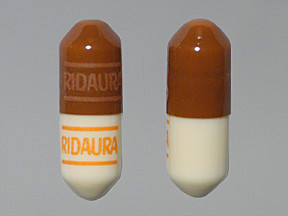AURANOFIN - ORAL
PHONETIC PRONUNCIATION: (aw-RAN-o-fin)
COMMON BRAND NAME(S): Ridaura
GENERIC NAME(S): auranofin
Uses
USES: This medication is used as part of a complete treatment program including non-drug therapies (e.g., rest, physical therapy) to treat active rheumatoid arthritis. It is used to treat patients with severe rheumatoid arthritis who have not responded to or cannot take other medications. Auranofin is a gold compound. Auranofin is not a true pain reliever (e.g., like aspirin) but it is thought to decrease pain that occurs with arthritis by decreasing inflammation. It is known as a disease-modifying antirheumatic drug (DMARD). It decreases morning stiffness and pain/swelling in joints and can increase grip strength.
How to use AURANOFIN - ORAL
HOW TO USE: This medicine comes with a Patient Information Leaflet. Read it carefully. Ask your doctor, nurse, or pharmacist if you have any questions. Take this medication by mouth, usually once or twice a day with or without food or as directed by your doctor. Dosage is based on your medical condition and response to therapy. To decrease side effects such as upset stomach, your doctor may start you at a low dose (once a day) and slowly increase to twice a day. Do not increase your dose or take this medication more often without your doctor's approval. Your condition will not improve any faster, and the risk of serious side effects may be increased. The usual maximum adult dose is 9 milligrams each day. Almost half of all patients have diarrhea or more frequent/loose stools while taking this medication. If this persists or becomes a problem, your doctor may lower the dose or have you temporarily stop the medication. Do not stop or change the dose of your medicine without talking with your doctor. Take this medication regularly in order to get the most benefit from it. To help you remember, take it at the same time(s) each day. If you have been receiving gold injections, you can usually start taking gold by mouth as soon as you stop the injections. If you are changing over from penicillamine, you will usually need to wait 1 month after stopping the penicillamine before starting auranofin. Ask your doctor for more details. It may take 3 to 4 months of therapy before you see the full benefits of this medication. Inform your doctor if your condition persists or worsens.
Side Effects
Precautions
Interactions
Overdose
Images
Reviews
Faq for AURANOFIN - ORAL
Auranofin is an oral medication used to treat arthritis, specifically rheumatoid arthritis.
Auranofin works by reducing inflammation in the joints and slowing down the progression of rheumatoid arthritis. It does this by inhibiting certain enzymes that are involved in the production of inflammatory substances.
Common side effects of Auranofin may include diarrhea, stomach pain, loss of appetite, rash, itching, and metallic taste in the mouth. It is important to consult a healthcare provider if these side effects persist or worsen.
Auranofin should not be taken by individuals who have a known allergy to gold compounds. It is also not recommended for use in pregnant or breastfeeding women, children, or individuals with certain medical conditions such as liver or kidney problems.
The exact time for Auranofin to take effect may vary from person to person. It may take several weeks up to a few months to experience the full benefits of the medication. It is important to continue taking the medication as prescribed by the healthcare provider, even if there are no immediate improvements.
Auranofin may interact with certain medications, including blood thinners, immunosuppressants, and medications that affect the liver. It is important to inform the healthcare provider about all the medications, supplements, and herbal products being taken, to avoid potential interactions. Additionally, it is advised to avoid alcoholic beverages while taking Auranofin.
Auranofin cannot cure rheumatoid arthritis, but it can help manage the symptoms and slow down the progression of the condition. It is important to continue the medication as prescribed even if symptoms improve, as discontinuing it may cause a relapse.
Auranofin is taken orally as capsules, usually once or twice daily as directed by the healthcare provider. It is important to follow the prescribed dosage and instructions carefully. It is recommended to take Auranofin with food to minimize stomach upset.
Auranofin can be used in combination with other arthritis medications, such as nonsteroidal anti-inflammatory drugs (NSAIDs) or disease-modifying anti-rheumatic drugs (DMARDs), as determined by the healthcare provider. Combining medications may provide better relief of symptoms and improved disease management.
Warning
WARNING: This medication can cause serious (sometimes fatal) side effects, including blood cell problems (e.g., anemia, low white blood cells/platelets), kidney problems, rash, itching, mouth sores/irritation (stomatitis), or persistent diarrhea. Low white blood cells can increase your risk of infection. See Side Effects section for more details. Tell your doctor right away if you develop any of these side effects. Your doctor will be closely monitoring certain lab tests (e.g., white blood cells, platelets) before you start therapy and before he or she prescribes refills of your prescription. It is important that you keep all medical/lab appointments
Disclaimer
IMPORTANT: HOW TO USE THIS INFORMATION: This is a summary and does NOT have all possible information about this product. This information does not assure that this product is safe, effective, or appropriate for you. This information is not individual medical advice and does not substitute for the advice of your health care professional. Always ask your health care professional for complete information about this product and your specific health needs.

No Reviews Yet